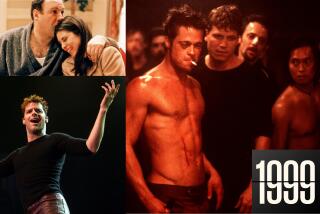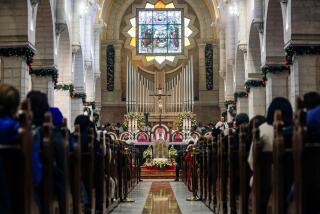It’s a New Day, Not End-Days, for the Church
Occupying extreme positions in the popular culture are two equally shallow views on the significance of the year 2000. One regards the millennial year simply as an excuse for the mother of all parties. Many resorts and hotels have already sold out for the New Year’s Eve to top all New Year’s Eves, with some people apparently hoping to multiply by a thousand times the artificial frivolity of the usual celebration. After all, only one generation out of 50 has the opportunity to witness the beginning of a new millennium. So “let’s do it up right” is the thinkinghere, with little attention being given to any other consideration.
At the other extreme are those apocalyptic visions of an end-all cataclysm that will engulf the world and its peoples, presaging the second coming of Christ and the final and eternal disposition of the good and the wicked. Polls indicate that 66% of Americans believe that Jesus Christ will return to Earth some day, and Catholics affirm their belief each Sunday with the words of the Nicene creed: “He will come again in glory to judge the living and the dead.”
But relating the crises and turbulent events of the late 20th century to a literalistic misreading of apocalyptic passages in Scripture (especially in the Book of Revelation), and to certain sayings of Christ and St. Paul about the end-days, is only to become a misguided doomsayer.
These prognostications conveniently ignore Christ’s urgent insistence that we not be led astray into such futile and mischievous speculation: “It is not for you to know the times or periods that the Father has set by his own authority.” It is an insistence that the church has had to rehearse through the centuries, up to and including Pope John Paul II’s recent caution against making apocalyptic predictions in connection with the year 2000.
Unfortunately, these warnings and the sober New Testament approach to the end-times issue have not deterred Christians (and others) in every age from endless, and inevitably fruitless, theorizing about when, where, how and why the end of the world will occur (one can imagine what the front page of the Leipzig Times might have looked like as the year 999 came to a close).
The significance of the year 2000 for the church is, of course, that it will mark the 2,000th anniversary of the birth of Jesus Christ. I say “of course,” and you would think that such an obvious statement should not have to be made. But when there is an ongoing effort to refer to the defining parts of human history not any longer as B.C. (Before Christ) and A.D. (Anno Domini, the Year of the Lord), but as B.C.E. (Before the Common Era) and C.E. (the Common Era), one can wonder.
For Christians, the birth of Christ initiated the central events of our salvation, establishing for us a relationship with God that became the foundation of our lives and history from that point on. It is not just a calendar event; it commemorates God’s union with creation and the unfolding of God’s purpose in human history. However inclusive of others our celebration must be--for God reaches out to all--the event we celebrate is a Christian feast.
From the outset of his pontificate, Pope John Paul has been consistent in calling us to celebrate the year 2000 as a jubilee. He wrote in his apostolic letter Tertio Millennia Adveniente (On the Coming of the Third Millennium): “The 2,000 years which have passed since the birth of Christ represent an extraordinarily great Jubilee, not only for Christians but indirectly for the whole of humanity, given the prominent role played by Christianity during these two millennia.”
It is a point not overlooked by the secular news media. Newsweek wrote on March 29: “For Christians, Jesus is the hinge on which the door of history swings, the point at which eternity intersects with time, the Savior who redeems time by drawing all things to himself. As the second millennium draws to a close, nearly a third of the world’s population claims to be his followers. But by any secular standard, Jesus is also the dominant figure of Western culture. Like the millennium itself, much of what we now think of as Western ideas, inventions and values finds its source in the religion that worships God in his name. Art and science, the self and society, politics and economics, marriage and the family, right and wrong, body and soul--all have been touched and radically transformed by Christian influence.”
And, of course, in contrast to the first millennium, when faith in Christ was confined to a small area of the globe, Christianity is now a worldwide phenomenon having a vital impact on all sectors and cultures of human existence.
It indeed, therefore, is a time for us to recall with jubilation our heritage and God’s favor, but at the same time, as Pope John Paul insists, not uncritically. As the church presents herself anew to the Lord, she must ask herself how much of Christ’s message has been heeded and implemented. The holy father summons the whole church to a collective examination of conscience regarding the mistakes and sins of the past millennium, and to recommit ourselves at the turn of a new age to be faithful disciples of Jesus Christ.
This means that we are to live and proclaim his gospel to promote the unity of all Christians, to work with all peoples for peace and justice, and to protect the world that God has created--a world so loved by God that the son took flesh 2,000 years ago and dwelt among us.
*
On Faith is a forum for Orange County clergy and others to offer their views on religious topics of general interest. Submissions, which will be published at the discretion of The Times and are subject to editing, should be delivered to Orange County religion page editor Jack Robinson.


